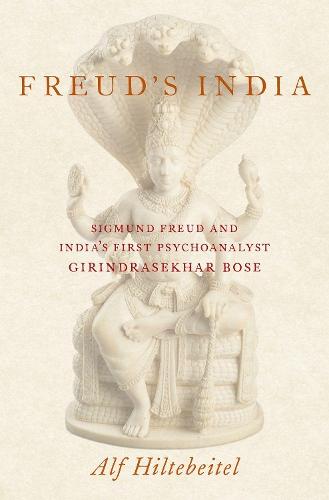Overview
The sharp contrast between cultures with a monotheistic paternal deity and those with pluralistic maternal deities is a theme of abiding interest in religious studies. Attempts to understand the implications of these two vast organizing principles for religious life lead to an overwhelmingly diverse set of facts and their meanings. In Freud's India, the companion volume to Freud's Mahs-- Sigmund Freud and Girindrasekhar Bose. Hiltebeitel examines the attempts of these two men to communicate with and understand each other and these issues in the heated context of emotionally divisive allegiances. The book is elegant in its nuanced attention to these two thinkers and its tightly controlled exploration of what their interactions reveal about their contributions and limitations as representatives of the psychology and religion of their respective cultures. Anxieties about mothers, says Hiltebeitel, separate Eastern from Western imaginations. They separate Freud from Bose, and they separate Hindu foundational texts from the foundational texts of Judaism.
Full Product Details
Author: Alf Hiltebeitel (Professor of Religion, Professor of Religion, George Washington University)
Publisher: Oxford University Press Inc
Imprint: Oxford University Press Inc
Dimensions:
Width: 16.00cm
, Height: 2.80cm
, Length: 23.60cm
Weight: 0.576kg
ISBN: 9780190878375
ISBN 10: 0190878371
Pages: 326
Publication Date: 27 September 2018
Audience:
Professional and scholarly
,
Professional & Vocational
Format: Hardback
Publisher's Status: Active
Availability: To order

Stock availability from the supplier is unknown. We will order it for you and ship this item to you once it is received by us.
Reviews
"""meticulous reconstruction of the disagreements between Freud and Bose"" -- Robert A. Segal, Reading Religion ""[a] wonderful book ... This volume, like its companion, marks another crucial contribution to the emerging study of global Freudianism ... Students of comparative religion, psychoanalysis and psychology, and the history of thought will find this volume immensely rewarding ... Highly recommended."" -- M. Uebel, CHOICE ""Spectacularly impressive. You can dip into these amazing volumes and find all manner of marvelous things--not only the valuable information about Freud, Bose, goddesses, and the Mahabhrata, but Hiltebeitel's highly creative ideas about them."" --Wendy Doniger, Mircea Eliade Distinguished Service Professor of the History of Religions, University of Chicago ""These volumes comprise the magnum opus of a distinguished historian of religions. It lovingly orbits around two cultural oeuvres of roughly the same length: the great Hindu epic of the Mahabharata and the Collected Works of Sigmund Freud. It is as if Hiltebeitel has treated the Mahabharata as one immense psychoanalytic exploration of the maternal polytheisms of Indian Hindu culture and the Collected Works as an unintended but appropriate mythology of Western civilization and its male monotheisms. Behind this astonishing comparison haunts the question: 'Can psychoanalytic methods work in different ontological structures? Can they work here, for example, in the panpsychic nondualism of the Bengali founder of Indian psychoanalysis Girindrasekhar Bose?' The answer appears to be: 'Yes, they can, uncannily so. And the analysis goes both ways.'""--Jeffrey J. Kripal, Secret Body: Erotic and Esoteric Currents in the History of Religions ""This fascinating study gives nuanced attention to a specific historical focusDLthe Freud/Bose lettersDLto open up a profound and comprehensive exploration of the place of the feminine in Hindu myth and thought and the lack of recognition of the feminine in Freud and in most of western thought."" --Marshall Alcorn, author of Resistance to Learning"
This fascinating study gives nuanced attention to a specific historical focus-the Freud/Bose letters-to open up a profound and comprehensive exploration of the place of the feminine in Hindu myth and thought and the lack of recognition of the feminine in Freud and in most of western thought. * Marshall Alcorn, author of Resistance to Learning * These volumes comprise the magnum opus of a distinguished historian of religions. It lovingly orbits around two cultural oeuvres of roughly the same length: the great Hindu epic of the Mahabharata and the Collected Works of Sigmund Freud. It is as if Hiltebeitel has treated the Mahabharata as one immense psychoanalytic exploration of the maternal polytheisms of Indian Hindu culture and the Collected Works as an unintended but appropriate mythology of Western civilization and its male monotheisms. Behind this astonishing comparison haunts the question: 'Can psychoanalytic methods work in different ontological structures? Can they work here, for example, in the panpsychic nondualism of the Bengali founder of Indian psychoanalysis Girindrasekhar Bose?' The answer appears to be: 'Yes, they can, uncannily so. And the analysis goes both ways.' * Jeffrey J. Kripal, author of Secret Body: Erotic and Esoteric Currents in the History of Religions * Spectacularly impressive. You can dip into these amazing volumes and find all manner of marvelous things-not only the valuable information about Freud, Bose, goddesses, and the Mahabharata, but Hiltebeitel's highly creative ideas about them. * Wendy Doniger, Mircea Eliade Distinguished Service Professor of the History of Religions, University of Chicago *
Author Information
Alf Hiltebeitel is Professor of Religion at George Washington University. He works mainly on the two Sanskrit epics, the Mah




